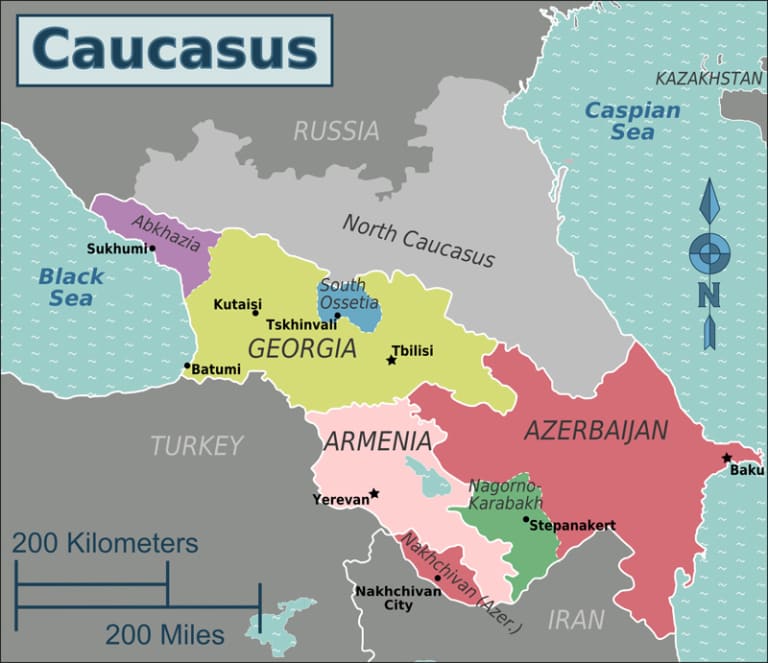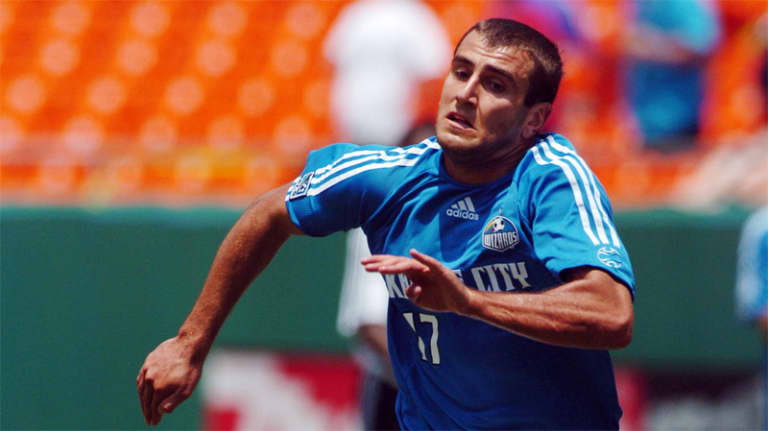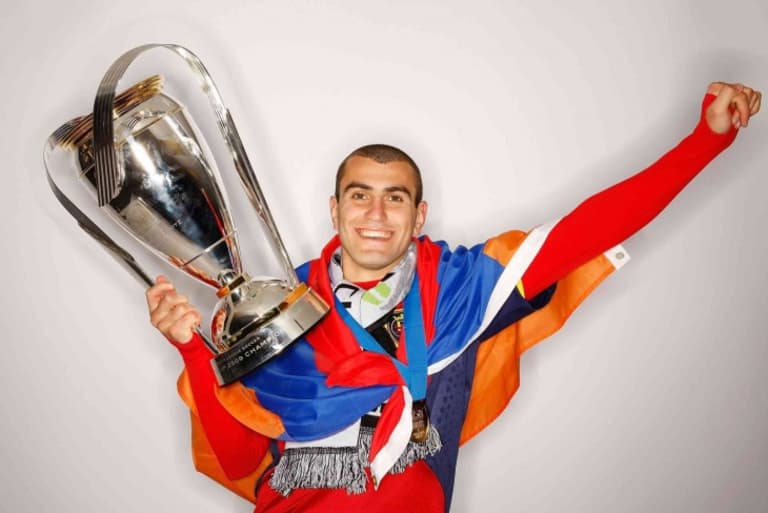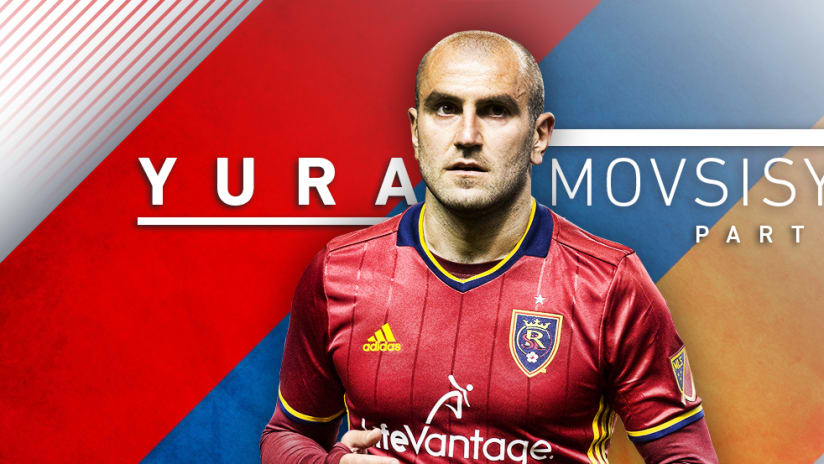This is Part 1 of a two-part series chronicling Real Salt Lake striker Yura Movsisyan's journey from Azerbaijan to Major League Soccer in the face of violence, political instability and long odds. You can read Part 2 here and watch Movsisyan lead RSL against D.C. United on Friday (10:30 pm ET; UniMas in USA and MLS LIVE in Canada).
IT'S JUST UNDER 30 MILES FROM PASADENA TO CLAREMONT, a straight shot east on the Foothill Freeway with views of the San Gabriel Mountains to the north and expansive subdivisions to the south. On the Los Angeles Metro bus, what’s normally a 35-minute drive usually took two hours, and in afternoon traffic it was often much longer than that.
Yura Movsisyan didn’t mind the time. The newly immigrated Armenian teenager would lose himself in English-tutoring sessions courtesy of Dr. Dre, Tupac Shakur and Snoop Dogg, staring out the window as his new city passed by.
“Everything in America was shiny,” the Real Salt Lake striker recalls of his first years in California after a childhood spent as a refugee in Western Asia. “Everything looked so new.”
And more than that, it felt safe.
At the bus stop in Claremont, a car would be waiting to pick him up. In the back seat was Tony Beltran, an All-American soccer star from Claremont High School who played club ball with Movsisyan for youth powerhouse Arsenal FC.
“That’s how it worked for a couple of years,” says Beltran, who has spent his entire MLS career with RSL and still marvels that he is playing professional soccer with a boyhood teammate. “Yura would come to our place and be like part of the family. He’d stay over for a few days and sleep on our couch.”
Between practices, the boys would kick a ball back and forth over the swimming pool in the backyard. In the evenings they’d play video games and watch movies. Movsisyan remembers waiting until the Beltran family was in bed, “pigging out in their fridge” and then lying on the couch, feeling as though he was seeing his future.
“Someday,” he told himself. “I’ll have a home like this.”
Sixteen years after coming to the United States, Movsisyan says he knows where home is. It’s back in Los Angeles, where his family resides and he plans to return when his playing days are over.
As for what home is? For a man who was raised as a refugee — and who has seldom known anything resembling permanency — that is a far more complicated question.
But now in his late 20s — and looking, he acknowledges, quite a bit older than that — Movsisyan is feeling the fatigue of a lifetime of emigration. Sunken into a loveseat in the unassuming home he’s renting on a hillside south of Salt Lake City, he says he would like to finish his career in a place that feels the way he imagines home should feel.
And at least for the moment, Movsisyan believes a home is what he’s found.
“We just had to get up and go”
Lenin Street was drenched with blood.
For Armenians in the Azerbaijani capital of Baku, life had long been difficult. On the night of Jan. 13, 1990, it became deadly.
Enraged over Armenia’s political annexation of Nagorno-Karabakh — a predominantly Armenian region that had been ceded to Azerbaijan under Soviet rule — armed gangs of Azeris stormed across the city, searching out Armenians, ripping them from their homes and destroying their possessions. Victims were executed in the road, tossed from balconies, bound together and burned alive.
“That is when we decided to get out,” recalls Movsisyan’s mother, Aida, “because they were going into houses and clearing out buildings, clearing out people.”
In what has come to be known as the Baku Pogrom, around 90 Armenian civilians were killed at the hands of the mobs. Police stood by and watched, and a week passed before the Soviet Union, then in a state of rapid collapse but still in control of both republics, sent troops in to quell the violence.
By that time, most of Baku’s Armenians had fled. Forever. There were nearly 200,000 Armenians living in Baku when Movsisyan was born. Today there are almost none — as if the entire population of Salt Lake City disappeared from the densely populated high desert valley where he now resides.
A Russian neighbor smuggled the Movsisyan family out of Baku in the middle of the night. “It was just us and some clothes,” Aida says. “That was all we had. We just had to get up and go.”
The violence has gone both ways in the long and bloody conflict between Azerbaijan, which rests between Iran and Russia on the western shore of the Caspian Sea, and Armenia, a predominantly Christian nation that splits across Azerbaijan’s western quarter and is surrounded on three sides by Muslim majority nations. Hundreds of thousands of people have been displaced on both sides. Tens of thousands have been killed.
As has often been the case for refugees, and as is still the plight of millions of displaced people today, Armenians and Azeris who fled the fighting in one place often found themselves no more safe in another.

Yura Movsisyan was born in Baku, Azerbaijan, on Aug. 2, 1987. His family stayed there until 1990, when ethnic violence forced them to move to Nagorno-Karabakh. Soon they were forced to move to Russia before eventually finding a home in Pasadena, California. Photo via Wikipedia
“They could sense the danger”
Movsisyan was two years old when he fled Baku with his father, mother and older brother. He does not remember the night of the pogrom.
His earliest memories are of no less terrifying times. In the days and weeks following the violence in Baku, the safest place for the fleeing Armenians seemed to be Nagorno-Karabakh. Except the newly declared autonomous region proved to be anything but safe. Supported at first by the Soviets and later by fighters from Afghanistan, Turkey and Chechnya, Azerbaijan fought to wrest back control of the region. The violence that swept across Nagorno-Karabakh did not spare civilians from either side; the fighting was all around them.
Movsisyan’s memories are hazy — like a nightmare he has not suffered through in a very long time, and would very much like to forget altogether. But these details he cannot help but remember: He was a little boy. He was running. People were chasing him.
“I had to run from gunfire,” he says.
Aida says there was only so much she and her husband could do to shield their boys from the war. “You can try,” she says, “but you cannot protect your children from what is happening.”
Again the family fled, this time to Russia.
“We didn’t have any documents,” Aida says. “Our birth certificates were all we had, so we were living illegally. All we could do was take jobs for cash.”
Unable to register to attend public schools in the city of Rostov-on-Don, near the eastern Ukrainian border, Yura and his brother, Movses, were homeschooled by their mother. They lived in dingy apartments and cheap hotels, never in one place for long.
“It sure wasn’t five-star hotels,” Movsisyan says. “It was no-star hotels. Just anything and anywhere we could basically spend the night.”
When Movsisyan reflects on his childhood now, he is hard-pressed to come up with a happy memory. He sighs and shifts in his seat. He scrunches up his face and looks at the ceiling.
Finally it comes.
“Any time I was outside with a ball,” he says, “that was happy.”
“An attitude about wanting to be something”
In Predrag Mijatovic, Movsisyan found a hero – and a path to follow.
The Yugoslavian striker, who “also had a funny name,” scored 30 goals for Real Madrid in the late 1990s, a stretch that included championships in La Liga, the Spanish Super Cup and the UEFA Champions League. Later Movsisyan came to idolize Brazil’s Ronaldo and France’s Thierry Henry.
He didn’t want to be like those players; he simply figured he would be.
“When kids meet, they ask, ‘What do you want to become?’” Movsisyan says. “I never said anything other than becoming a professional soccer player.”
When it was safe, he played in the streets. When it was not, he played inside. “He was always annoying everyone with the ball,” Movses recalls.
Yet Movsisyan wouldn’t play a single game of organized soccer until the winter of 2000, when he was 13 and his family finally arrived in California, where some extended relatives lived and many Armenians had relocated. There the family settled in the Armenian diaspora community — big enough to be the second-largest city in Armenia itself — while applying for political asylum.
Cherif Zein didn’t know what to make of the brooding but confident freshman boy he met on the soccer field at Pasadena High School.
“He was a very nice kid — a quiet kid but sweet,” says Zein, who was then the head coach at Pasadena. “I liked right away that he had an attitude about wanting to be something. I like the ones that have this sort of vision that they are going to do something great. If they say they are going to be a pro, who are we to tell them otherwise?”
Although Movsisyan spoke little English, he seemed to pick up instructions quickly. Still, Zein adds, the boy was all aggression, instinct and desire.
“At that time, I can’t say his play was very sharp,” he recalls.
Movsisyan’s potential was undeniable, but he was lacking in the sort of nuanced, technical knowledge that makes good players great. That, Zein told his new protégé, would only come from playing under as many knowledgeable coaches as he could.
It wasn’t always easy to get to those coaches. Movsisyan’s father had found work in an auto body shop. His mother worked at a dry cleaner. Movses was working in an Armenian grocery store. The family had one car.
“I’d wake up at 5 am so that I could train in the morning before school,” Movsisyan recalls. “After school I’d go to practice for the high school team and then I’d get on a bus.”
The Beltran family didn’t just show him what a comfortable American existence could look like — they showed him what it meant to have a home away from home. “I could never repay what they did for me,” Movsisyan says.

Though his path to the pros was unconventional, Movsisyan never let go of his dream. He was drafted fourth in the 2006 MLS SuperDraft by the then Kansas City Wizards after spending a season at Pasadena City College, where he scored 18 goals. Photo via USA Today Sports Images
“Armenians against the rest of the world”
After high school, Beltran went to St. John's University in New York, then transferred back to UCLA and played for the United States’ Under-20 team. He was drafted by RSL the following year. Insomuch as there is a typical pathway by which an American youth player reaches MLS, that was it.
Movsisyan’s path was anything but typical. Expelled from Pasadena High for fighting when he was a sophomore — an incident he remembers as having something to do with a feeling that it was “Armenians against the rest of the world” — Movsisyan attended two other high schools before being permitted to return to Pasadena for his senior season.
He struggled with academics, never really enjoyed schoolwork, and didn’t count on attending college. But Zein, who was also the coach at Pasadena City College, told Movsisyan that if he played a season with the local community college team and scored “15 or 17 goals,” a few scouts would take notice.
Movsisyan scored 18, and the scouts did as his coach predicted.
“All of the sudden there was talk about this player, this really talented player coming from a community college,” recalls RSL head coach Jeff Cassar, then a goalkeeper for FC Dallas. “At that time that wasn’t happening all that much.”
As the 2006 SuperDraft approached, it was clear Movsisyan, despite his relatively low profile, was going to be a high pick.
Chivas USA showed particular interest. Movsisyan was thrilled. Bob Bradley — who had already won an MLS Cup and two US Open Cups with Chicago — had just been hired to manage the Goats. More importantly, Chivas’ stadium, now known as StubHub Center, was just 45 minutes down Interstate 110 from his family in Pasadena.
For Movsisyan, who had just started dating an Armenian girl who would later become his wife, everything seemed to be coming together perfectly. After a childhood of instability, he started to think of Los Angeles as home.
“I knew Chivas liked me,” he says. “I had a strong Combine, so I was feeling good about it. It seemed natural for me to go to LA.”
Chivas had the fifth pick in the draft, but Kansas City had the fourth — and Movsisyan went to the Wizards.
“That was a shocker,” Movsisyan says. “We hadn’t even had a conversation about what would happen if I got drafted somewhere else. I really hadn’t considered the possibility that I’d go somewhere other than Los Angeles.”

Movsisyan scored 16 goals in two-plus years with Real Salt Lake, a stint that included an MLS Cup victory, before moving to Denmark to play for Randers FC in late 2009. Following RSL's victory against the LA Galaxy to claim the 2009 title, Movsisyan wrapped himself in an Armenian flag. Photo via Real Salt Lake
“An amazing place to play and live”
Craig Waibel had seen players like Movsisyan before. Plenty of them. And the younger and faster they were, the more the veteran Houston defender enjoyed putting them on their backs.
“I liked to intimidate them,” recalls Waibel, who first squared off against Movsisyan at Arrowhead Stadium in June of 2007.
When Waibel sent Movsisyan to the ground, the young forward popped back up and congratulated the defender on a good play.
“I remember thinking, ‘How am I going to get in his head?’” says Waibel, who is now RSL’s general manager. “If I knew his backstory, I wouldn’t have bothered.”
Movsisyan was 19 years old when he left for Kansas City. He was used to moving, but not to being alone. A few months into his stay in the Midwest, he proposed to his girlfriend, Marianna. “I wanted her to be out there with me, but because of our traditions we couldn’t be living together unless we were married,” he says.
It was hard being so young in a new place, but the young couple found a small group of friends, and even some fellow Armenians, in Kansas City. They were just starting to feel comfortable when RSL traded for Movsisyan, who scored five goals in 28 games for the Wizards, in Sept. 2007.
It didn’t take long for the Movsisyans to find “a happy place” in Salt Lake City. RSL reached the playoffs for the first time in 2008 — with Movsisyan scoring the franchise’s first postseason goal — and won MLS Cup a year later.
It felt good to be part of a club that was in the midst of making history. But something else happened in Utah that would be crucial to how Movsisyan would view the next seven years of his life: He finally began to understand what it felt like to settle comfortably in a community of people who clearly wanted him and his family to stick around.
Salt Lake, he says, “is really just such an amazing place to play and live and have a family.”
The desire to embrace that experience conflicted with other aspirations. Since he was a small boy — watching Mijatovic and Ronaldo at Madrid, and Henry at Arsenal — Movsisyan had longed to play in Europe.
The boy who’d grown up with little more than a bag of clothing and a soccer ball had always aimed to earn enough to ensure his parents could live comfortably for the rest of their lives — and Movsisyan figured the fastest way provide for his family and live his dream was to move abroad.
Months before RSL lifted the cup, and long before it was clear that the then-middling team would even so much as make the playoffs, Movsisyan agreed to join Denmark’s Randers FC when his contract was up at the end of the MLS season.
After Robbie Russell buried his penalty kick to give RSL a historic MLS Cup title, Movsisyan wrapped himself in an Armenian flag and celebrated the victory with his teammates. Then he returned to Utah to pack up his belongings.
On Christmas Day 2009, the Movsisyans' first son was born. A few days later they left for Europe.
Check out Part 2 as Movsisyan establishes himself in European club soccer and excels with the Armenian national team before leaving millions of dollars on the table to return to Utah.
THE WORD is MLSsoccer.com's regular long-form series focusing on the biggest topics and most intriguing personalities in North American soccer.













